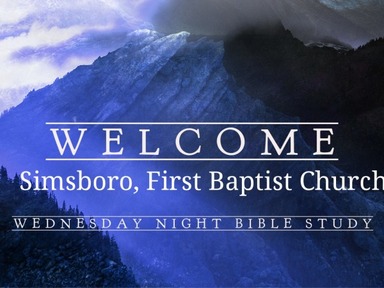Psalm 23:1

Notes
Transcript
THIS psalm was written by David, either when he was in distressed circumstances, being persecuted by Saul, and was in the forest of Hareth, 1 Sam. 22:5. as some think; wherefore he comforts himself with the Lord’s being his shepherd, so that he should not want; nor would he fear, was he in worse circumstances than he at present was; or rather, when he was settled upon the throne of Israel, and in the most prosperous and flourishing state of his reign, as the latter part of the psalm shews; he speaks not in his own person only, but in the name of all believers; for Christ, who is the shepherd spoken of, is a common shepherd to all the saints, who are all the sheep of his pasture, as well as David; and the prophet here makes use of similes very familiar with him; he having been a shepherd himself, and knew what it was to do all the parts of that office, which are herein expressed; and very pertinently does this psalm follow the former; for as there Christ is prophesied of as laying down his life for the sheep, as the good shepherd does; and of his being brought again from the dead, as the great shepherd of the sheep, as Christ has been; so here of his performing his office as such, in all its parts, to the great comfort, refreshment, and safety of his people.
1 The Lord is my shepherd; I have what I need.
The Lord is my shepherd
“The Lord …”—not a Lord, but the Lord. When David wrote this, the Egyptians had 360 primary gods—one for every day of the week. The Canaanites, in whose land the Israelites came to live, they had many gods. But David knew there is but one God: the Lord. We could put the emphasis on the word Lord: the great sovereign, eternal God, the King that we’ve been singing about, the One who rules over all.
“Lord” is in all caps—that is, it is in all capital letters. Is yours that way: “Lord” in all caps? You see, the reason it is there is to tell us that this word that is translated “Lord” is a translation of an Old Testament name for God that is the most sacred name for deity that the Jews had—and it is the word Jehovah. And every time you see it in all caps, it means “Jehovah.” And you can say, “Jehovah is my shepherd.”
And the name Jehovah was such a sacred name. It means the self-existing One, the One who never had a beginning, the One who never has an ending, the great I Am. “Jehovah is my shepherd.”
“The Lord is …”—we could put an emphasis on the word is. When I was in Florida about twenty years ago, I heard the great black preacher, S. M. Lockridge, preach on the lordship of Christ. And he quoted this verse, and he stopped right there when he said, “The Lord is …,” and he began to talk about that little word is. And he said this: “The Lord always has been is, and the Lord always will be is.” I like that. He was talking about the eternality, the unchangeability, the immutability of our great God. He said, “You can’t keep your tenses straight when you talk about our God.”
“The Lord is my …”—and then we could just pull over and park, and talk a long time about that little word—“my shepherd.” (Psalms 23:1) Not the shepherd, not a great shepherd, a good shepherd—He’s all of that—but my shepherd. And we could talk about the personal relationship with our Lord. We could talk about the word shepherd and put the emphasis upon “the Lord is my shepherd” and how He is the One who is responsible for every care that the sheep might have. And that’s where we’re going to look—in this first verse—this morning, and find the secret of satisfaction.
We Are The Sheep
A friend of mine who moved to Oregon once heard me talk about sheep. He said to me later, “Dr. McGee, you gave me the impression that sheep are nice, sweet little animals. You made them appear so helpless. I want to show you some sheep.” He invited me to dinner. He gathered several sheep together, and after dinner we went out to look at them. As we watched them, he told me, “These sheep are stubborn, hardheaded, and pig-headed animals. Besides that, they are dirty and filthy.” I said, “That’s a picture of the human race.” They do set us forth!
J. Vernon McGee, Thru the Bible Commentary, electronic ed., vol. 2 (Nashville: Thomas Nelson, 1997), 712.
I shall not want;
Not any thing, as the Targum and Aben Ezra interpret it; not any temporal good thing, as none of Christ’s sheep do, that he in his wisdom sees proper and convenient for them; nor any spiritual good things, since a fulness of them is in him, out of which all their wants are supplied; they cannot want food, for by him they go in and out and find pasture; in him their bread is given them, where they have enough and to spare, and their waters are sure unto them; nor clothing, for he is the Lord their righteousness, and they are clothed with the robe of his righteousness; nor rest, for he is their resting-place, in whom they find rest for their souls, and are by him led to waters of rest, as in the following verse: the words may be rendered, I shall not fail, or come short; that is, of eternal glory and happiness; for Christ’s sheep are in his hands, out of which none can pluck them, and therefore shall not perish, but have everlasting life, John 10:27, 28, 29.